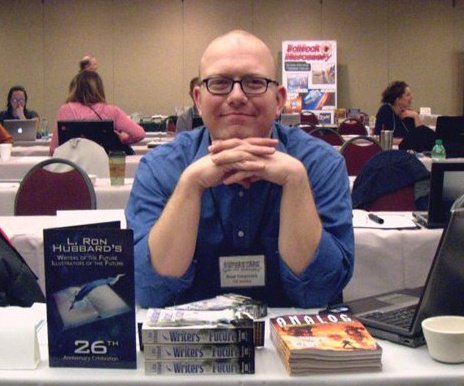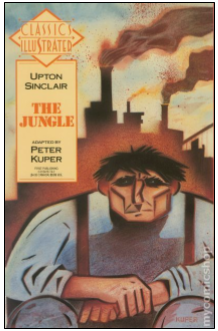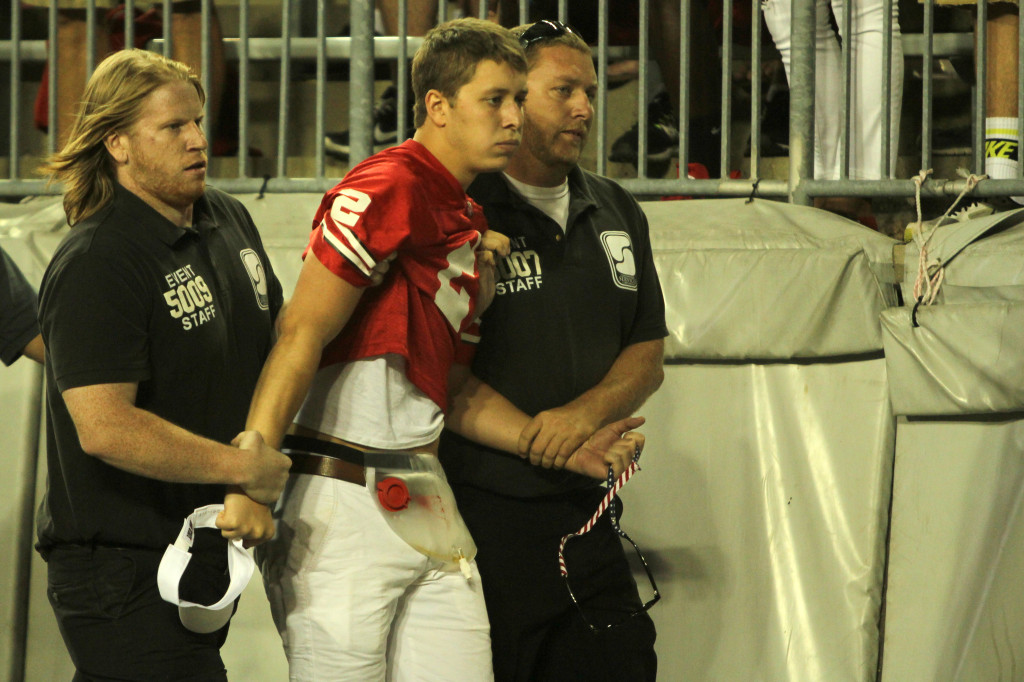Brad Torgersen's 'Science Fiction Civil War'

Since 2008 I have voted in the Hugo Awards, the science fiction/fantasy honors that have the most prestige. The ballot for this year's awards has been hijacked by three right-wing authors -- Larry Correia, Brad Torgersen and Vox Day -- who ran bloc-voting campaigns that put their nominations all over the ballot to the exclusion of everyone else's. For months, they campaigned for people to vote for their slate of nominees by saying this act would stick it to a secret cabal of "social justice warriors" who had been keeping conservatives like them from winning.
There is no cabal.
Anyone can vote for the Hugos by buying a $40 supporting membership in the next Worldcon. That's what I did seven years ago, and since then I've been nominating works I liked without outside interference from anybody else, just like thousands of other fans.
To give you an idea of how cynical and politically motivated the bloc-voting campaign was, Correia reached out to GamerGate for support in his attack on the Hugos. ("I think GamerGate has been awesome," he declared yesterday on Twitter.)
Rather than cover the entire mess a week later than everybody else, I'll direct you to the blog of Game of Thrones author George R. R. Martin, who has written an excellent series of posts as an author who has participated in the Hugos since the 1960s and loves the institution of Worldcon.
There's a lot about this situation that gets me all het up, but I'm beginning to savor the insane grandiosity of Torgersen (pictured above), a previously obscure SF/F author who led the bloc-voting campaign this year and dubbed it "Sad Puppies 3."
On April 8, Torgersen wrote a blog post on his personal site called "The Science Fiction Civil War" that he later deleted.
Here's the text of that post, which offers a fantastic glimpse into the preening self-regard that inspired him to lead a culture war against a much-loved SF/F award that fans of all political beliefs have nurtured since 1953:
A personal note, from a guy who has been trying hard of late to recapture some of the sense-of-wonder he felt for science fiction, when he was a boy.
The cannon have been fired. There's no doubting it now. Decades of simmering tension are being unleashed in an emotional struggle for the future of the field. The Hugo award is just a thing; a mere football. These divisions go far beyond a silver rocketship. They are drawn along political lines -- liberal, and conservative; progressive, and libertarian -- as well as along artistic lines -- taste, expression, and the desire for meaning. If one side has announced angry shock that Sumter got shelled, it's because that side had the luxury of ignoring the other side. At least until now. The grays have thrown off their teeth-grit veneer of second-class citizenship, and the blues are rallying to the status quo. Voices long quiet, have erupted with the yell of rebellion. And there is every sign in the world that the blues will stop at nothing to put down the grays.
I remember when I used to think science fiction was this happy, fraternal place. If there were disagreements, they were small things, and no adult would let them stand in the way of a rousing all-for-one-and-one-for-all cheer. A round on the house for everybody, ladies and gentlemen! Hip-hip-hooray!
I believe there may have been a time when the reality at least approached this naive impression -- an idea planted in my imagination, and fueled by the dreams of ambitious youth.
Now I am no longer green. This year finds me a veteran. I have seen the quiet hate in the eyes of so many colleagues. For each other. For the other guys. For the people beyond the next rise of mountains. It is a hate bred by a thousand slights and prejudices, snobberies and injustices and cuts which have bled quietly into the night. You see it every time one professional's celebration is conducted so as to kick sand in the face of another professional. The fans -- volunteers from the common parts of every locale -- line up along the fence rows and rock walls, nervously checking their cartridge boxes, and wondering when they can get a chance to lick the enemy.
Many people never thought it would come to this.
Now that we're in it, I have to ask: how could it not have come to this?
You can only paper over cracks in the foundation so many times, before the foundation falls apart.
The silhouette of Larry Correia stands on a lonely knoll, his beard jutting proudly like Robert E. Lee's -- or is it Ulysses S. Grant's?
The judgments of history -- far removed from the sound of the guns and the bloody casualties laying like cord wood across the fields and in the gullies and meadows -- will have to judge which "side" in this fight is the blue, and which is the gray.
I knew the moment I took up the flag for Sad Puppies 3, that I was sacrificing forever any chance of ever being a Hugo award winner. There would be no forgiveness. Not from the traditionalists who jealously guard their trophy and consider all complaints against it to be heresy. But I was resolved. As an object of merit, the thing had fallen into question for me -- along with so much of the rosy history I thought I understood, before I was published.
Now there is only the war. A war which nobody wants, and yet nobody can avoid. All the rancor and chaffing and preening distaste for "those who are not like us" ... flooding forth in a wave of bitter rage that is enabled from behind the immunity and protection of ten thousand keyboards.
I have the sense that this thing is going to change us all in some way, forever -- those of us who make some part of our lives in this country called science fiction. Now splintered and divided.
What's left for a man now is to do what his heart, and God, tell him is right.
And it will be up to the future to decide if I am a hero, or a villain. Perhaps I am both?
I will either be Phil Sheridan, or A.P. Hill. George Henry Thomas, or Stonewall Jackson.
If I hope for anything -- when all of this is over -- it's that the Hugo means something again, and that the blind spots, biases, prejudices, and petty shadowing are reduced, if not erased. So that other people who come to it in the future, won't find it the way we found it -- before the fighting turned hot.
Most folks will stay home. Many already bitterly resent the conflict. Damn all flags.
When the survivors are old and all the generals long dead, they may ask, "Was it worth it?"
Lord, I sure hope so.
Torgersen and Correia, who have cultivated an enormous sense of personal aggrievement about alleged anti-conservative bias in the Hugo Awards, were both nominated by Worldcon voters to the John W. Campbell Award for Best New Writer in the last four years. That's the highest compliment that we pay to new writers and often a springboard to a successful career in SF/F.
But neither of them won. Correia lost to Lev Grossman in 2011 and Torgersen to E. Lily Yu in 2012.
So to them, I guess "THIS MEANS WAR!"
Tackled Ohio State Student Was Wearing Booze Panties
There's a video going viral of a student running onto the field at the Ohio State/Cincinnati college football game Saturday night and receiving a ferocious open-field tackle by Ohio State strength and conditioning coach Anthony Schlegel to the roaring approval of the home crowd.
Press reports indicate that the student is Anthony James Wunder, a 21-year-old senior in mechanical engineering who is an Evans Scholar, a full tuition and housing scholarship for golf caddies based on grades, character and financial need.
If you're wundering what would make a college student put his academic career in peril so close to graduation with such a goofy stunt, the answer probably can be found in one of the photos of the incident from The Lantern, the student newspaper at Ohio State.
Take a look at the weird fanny pack Wunder is wearing as he's marched off by stadium security:
The distinctive red cap indicates that it's a Freedom Flask, secret plastic panties that hold 32 ounces of "your favorite beverage." The photo appears to indicate that Wunder's booze briefs were running on empty before his dash to infamy.
The Freedom Flask, invented by a former University of Georgia student who tired of sneaking alcohol into sporting events, requires pouring yourself a drink through your pants. The site offers this reassurance to potential purchasers: "If you think it may be awkward pouring a drink from your fly -- it's not. What's awkward is being the guy who gets his flask taken by security. To be honest, we wish we would have thought of this sooner."
M.C. Moewe and the Story That Got Away
You know how on cop shows there's often a veteran detective who can't let go of an unsolved case for years? My wife M.C. Moewe has been like that because of a story she reported that no publication will touch.
She's a former investigative reporter who worked at the Daytona Beach News-Journal, Fort Worth Star-Telegram and other newspapers.
Around a decade ago a big assignment was dropped on her desk: Family courts were giving custody of kids to a parent accused of sexual abuse and denying custody to the parent who alleged abuse -- even when credible evidence and experts raised alarms. Judges were delegating their responsibility to investigate to custody evaluators, experts shielded from legal liability who claimed that the concerned parent suffered from Parental Alienation Syndrome, a discredited psychiatric theory employed to completely dismiss allegations a child is being abused by a parent.
Twice her story was accepted by editors, prepared for publication and then killed right before it saw print.
It's the kind of story that needs a big media organization behind it. She tried several times to get it published, learning more each year about the subject as she heard from desperate mothers who lost custody of their children once they reported concerns about possible abuse. By her count, she now knows 30 women who've suffered this fate. I've heard her take long phone calls with these moms many times, and twice she attended the Battered Mother's Custody Conference. She's become an expert on a subject she never got to report on.
Last month, M.C. decided to tell the story of the scandal in the family courts as a weekly series for Daily Kos. She isn't running the specific story that got spiked, but instead writes about the entire system. The first installment explains her reasoning:
If I couldn't shine a light on a problem as bad as this one, then journalism just didn't fit with me anymore.
So I decided to come here and write what I normally call thumbsuckers –- stories that explain how a system is broken –- about our family court system.
She filed the sixth story in the series today, and it's a huge one: Mandatory reporters who tell the authorities about child abuse, as required by law, are losing their careers for coming forward:
After two preschool children indicated their father was abusing them and one child tested positive for a sexually transmitted disease, a health care professional treating the youngsters followed her state's mandatory reporting law -- but now she's the one in trouble.
"They act like I made it all up," the professional, who agreed to be interviewed on the condition of anonymity, said of her state licensing board. "I have lost business and I'm having trouble getting back into a couple of insurance networks."
She's confident she made the right decision to report the suspected sexual abuse but is baffled why a state agency has joined the alleged abuser in questioning her motives. "Less than five percent of children who report sex abuse are telling lies," said the professional.
Child psychologists and others who work to protect abused children say this is a common scenario -- they report abuse and suffer retaliation when the alleged abuser files a complaint against them. They say the actions taken to punish them by government agencies speak louder than the mandatory child abuse reporting laws.
Within minutes of posting the story, she started hearing from mandatory reporters who fear the consequences of doing the right thing. One said, "After reporting, in Pennsylvania, I hold my breath for a month."
Programming a Confidence Pool for the World Cup

I did some coding yesterday to run a 2014 World Cup confidence pool on SportsFilter. The way a confidence pool works is you assign points to teams based on how confident you are they will win. In this contest, you get point values from 32 down to 1 and assign them to the 32 World Cup teams. The more points you assign a team, the more you are awarded when that team wins or ties a match.
Anyone can sign up for a SportsFilter account and play. A prize will be awarded to the winner: the Adidas replica version of the official World Cup ball. The deadline for entries is shortly before the first match Thursday.
I wrote the web application in PHP, stored the database in MySQL and used the Smarty PHP template engine for the presentation. This was a project I had to complete in a single day, so I didn't think I'd go to the trouble of using Smarty. I figured I would just kludge together some ugly PHP pages that had code and HTML markup mixed together.
But Smarty makes it easier to present the HTML output of a PHP web application. I find that I write better PHP code when I use it and there's less debugging required to get things right.
The way Smarty works is you write a PHP script that does the work such as collecting user input and storing data, make some variables from that script available to Smarty and tell it to load a template file that contains HTML and some simple code to present information.
Here's the last part of the script that displays the contest entry form and validates what the user has submitted:
// make data available to templates
$smarty->assign('spofi', $spofi);
$smarty->assign('page_title', "Enter the SportsFilter World Cup 2014 Confidence Pool");
$smarty->assign('spofi', $spofi);
$smarty->assign('form_output', $form_output);
$smarty->assign('error_message', $error_message);
$smarty->assign('random_team', $random_team);
$smarty->assign('submit_widget', $submit_widget);
// display output
$smarty->display('header.tpl');
$smarty->display('confidence-pool.tpl');
$smarty->display('footer.tpl');
Those three .tpl files are templates. The header and footer contain the SportsFilter layout and the main body of the page is in confidence-pool.tpl.
Here's a portion of that template:
{$error_message}
<p><form action="/confidence-pool.php" method="post">
{$form_output}
<input type="submit" value="Preview My Entry" name="command">
{$submit_widget}
</form>
Smarty's template language can do more than display variables. It has for loops to display every element in an array and formatting functions that can do things such as control how the elements of a date are displayed.
I also used it on Wargames.Com. Here's some template code from the state directory pages:
{foreach from=$stores item=store}
<p class="directorystore">
<span class="directorystorename"><a href="{$store.link}">{$store.name}</a><br /></span>
{if $store.phone neq ''}<span class="directorystorephone">{$store.phone}<br /></span>{/if}
<span class="directorystorelocation">{$store.city}, {$store.statename} {$store.zip}<br /></span>
</p>
{/foreach}
The $stores variable is an array with link, name, phone, city, statename and zip elements.
The ultimate goal of today's project is to make it possible for a website's users to create and run their own confidence pools for any sporting event that lends itself to this type of contest. One sport it would be ideal for is the NFL, with players ranking the teams playing that weekend and competing all season.
Who Would Steal a Honda Odyssey?

I got up this morning to take my son to school and our minivan was missing from the driveway. It had been stolen. I kept pushing the key fob buttons expecting it to magically reappear.
Somewhere in Florida today there is a thief who appreciates the flexible cargo space and peppy car-like handling of the 2012 Honda Odyssey.
Ghost of Computer Author Past
You could tell a lot about an author or conference speaker by tracking the changes made to that person's short bio over the years. Here's how I described myself in 1996 for Java Unleashed, Second Edition, a frankenbook written by 24 authors in the book publishing rush after Java was launched:
Rogers Cadenhead is a web developer, computer programmer and writer who created the multi-user games Czarlords and Super Video Poker. Thousands of readers see his work in the Fort Worth Star-Telegram question-and-answer column "Ask Ed Brice." Rogers has developed Java applets for Tele-Communications Inc. and other clients, and is the coauthor of Teach Yourself SunSoft's Java Workshop in 21 Days. Rogers wrote Chapters 1, 5, 17 and 18 and contributed to Chapter 2.
It didn't take long for me to drop references to Czarlords and Super Video Poker, two online games I created for bulletin board systems. My friend Mark Terrano and I started a company to create multi-user BBS games right before the Web came along and killed the businesses of every potential customer. Our total earnings were $180.
Terrano did a little bit better on his next game venture. He was lead designer of Age of Empires II and is a founder of Hidden Path Entertainment.
Interview with Zoe Zolbrod
A version of this post originally appeared in the May 2013 mailing of the Capa-Alpha APA.
During the early '90s when I took a stab at becoming a comic book writer, I requested submission guidelines from several dozen publishers. One of the people I heard from was First Comics submissions editor Zoe Zolbrod. Her letter of Feb. 5, 1991, shared a new plan the company was undertaking. "First is going to begin to publish black-and-white, limited-series, creator-owned comic books," she wrote. "These would be sent to us by the creator all ready to be shot and printed (scripted, penciled, inked and possibly lettered). ... There would be no page rate for these books; instead the artist(s) would get a predetermined percentage of the profits."
The letter and First's submission guidelines are linked.
After being one of the most successful comics companies to spring up in the '80s, First was fading fast by the time of my letter. After it shut down in 1992, Zolbrod stayed in publishing and has become a book editor, essayist and novelist.
In the late '90s she published the zine Maxine, billed as a "literate companion for churlish girls and rakish women."
Her 2010 debut novel Currency is about a female American backpacker in Thailand who has a romance with a local street hustler that brings her into the world of exotic animal smuggling.
On an impulse, I looked up Zolbrod on the web and she agreed to answer some questions in email about her days at the company.
![]()
Question: It looks like you got the First Comics job right after graduating from Oberlin, based on your LinkedIn profile. How long did you work at First and what was it like to comb through the submission pile? Do you recall any of the writers and artists you discovered whose books went on to be published?
Zolbrod: I got the job as editorial assistant for First Publishing in 1990, a few months after graduating from Oberlin, thanks to a tip passed through the Oberlin grapevine that started with Anina Bennett, who was an editor there. One of the things I did as part of my interview process was to review a couple of unsolicited submissions, because dealing with the slush pile was a big part of the job. I was far from a comics geek. I liked a few alternative things like Hate and Love & Rockets, but I had virtually no familiarity with the world of super heroes, which was a lot of what First published and received as submissions. I remember deciding to just give my honest opinion of the comics I was given to review, including my feminist analysis, because I didn't even know enough to fake something else. I guess the other candidate they were considering had more comics knowledge, but First was mostly looking for someone who could write and think critically, and so they took me on.
I looked at probably hundreds of submissions and dutifully wrote a personal note back to most everyone, which encouraged a couple people to respond a little too enthusiastically. I only found a few things that I thought were worth passing up the chain based on the criteria I was given, and of those, only one did everyone get excited about. I can't remember the name or the artist now, but there was some discussion with the guy about signing him. Little did I know, though, that I had arrived at the beginning of the end of First.
Within a year of having taken the job, the company decided to move from a monthly publishing schedule to a quarterly one, and the ceased signing anyone new. Soon after that, they suspended publication entirely -- actually, Lone Wolf & Cub might have limped on for awhile -- and laid a bunch of people off.
I kept my job -- probably because I was working for peanuts -- but things eventually ground down to a stop. I was there for less than two years, but that job really changed my life. I had gotten a little editorial experience, and I also got a bonus for sticking around until the bitter end. The bonus provided me with a nut of money that allowed me to backpack around Southeast Asia for the better part of the year.
Q: The letter I received was from February 1991 in response to a request for submission guidelines. You described how First was planning to start publishing black-and-white, creator-owned comic books that were submitted in completed form to the company. First would only do the cover and possibly redo the lettering. Was this a last-ditch effort to keep the company in business, and do you recall if anything came of it before it closed?
Zolbrod: Oh, I forgot about that. Now that you mention it, I think that was the criteria I was given for what to pass up the chain. The one submission everyone liked was to be part of it. But no, nothing ever came of it. Things started going downhill fast very soon after I sent that letter.
Q: It looks like the final things First published were Eric Shanower's Blue Witch of Oz, the final issues of Dreadstar, Grimjack, Lone Wolf & Cub, and a Classics Illustrated adaptation of Upton Sinclair's The Jungle by Peter Kuper (I need to find a copy of that). What do you think caused the demise of the company, one of the most successful comic book publishers of the '80s?
 Zolbrod: I believe I recall the Peter Kuper art coming in. I had been aware of him before I started the job and was really impressed. It made working there seem glamorous. There was often quite a buzz when the Classics Illustrated art came in, and we would all gather round, but I didn't work with any of those artists. They had their own team, and I was an underling.
Zolbrod: I believe I recall the Peter Kuper art coming in. I had been aware of him before I started the job and was really impressed. It made working there seem glamorous. There was often quite a buzz when the Classics Illustrated art came in, and we would all gather round, but I didn't work with any of those artists. They had their own team, and I was an underling.
Although I hadn't heard of Grimjack before I started, that was the First series that I genuinely got into. I was sad when it went to a quarterly and then ceased. I wasn't in the know enough to have a really clear picture of what happened, but I recall hearing that the licensing of Teenage Mutant Ninja Turtles had been a huge cash cow for First, and that had ceased by the time I got there in '90. I think the licensing with Classics Illustrated and Lone Wolf might have been expensive, and their own series weren't doing as well as they had been.
Q: You published the novel Currency inspired by your experiences traveling Southeast Asia alone, and now you're working on a memoir about suffering sexual abuse as a child. How did you decide to write about a subject so difficult, and how is it going?
Zolbrod: I'm looking at the memoir as being more about how I interpreted what happened to me as a child at different stages of my life, and less about the actual abuse. It's a situation with a lot of gray area, or at least a lot of psychological gray area to me. I guess I came to writing about it in the hopes of gaining a better understanding, which has eluded me all these years.
Also, I became aware that this issue affects a lot of people in nuanced ways that aren't well represented, and I want to add to the dialogue. I have a strong vision for the book and it's going well, if not quickly.
![]()
To find out more about Zoe Zolbrod's books and read her blog The Next Youth Hostel, visit her website ZoeZolbrod.com. She also is a frequent essayist for the literary site The Nervous Breakdown.





